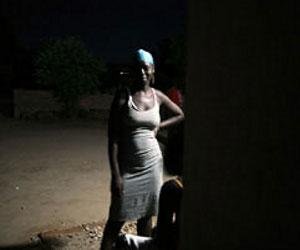LUSAKA, Zambia (WOMENSENEWS) -- These days, Comfort Mwansa, 26, has a full, busy life.
While attending school, she also makes and sells doormats to meet expenses. She is looking forward to having a family and giving her children a better life than her own.
"I want to work hard and make sure that the children I will have in the future will have everything they need," she says.
Mwansa is one of many women who say their lives have been turned around by the Tasintha Programme, a grassroots nongovernmental organization that aims to eliminate commercial sex work and HIV/AIDS in Zambia.
Lucy Bwalya, Tasintha's program officer, says it has recruited and provided skills training to 7,000 female sex workers in Lusaka since 1992. Of them, about 60 percent have left sex work; 120 have died from AIDS and other diseases.
Kunda Matipa, Tasintha's operations officer, says that recruiting sex workers on the street to stop sex work and join Tasintha isn't easy.
"At times during the process of recruitment, we have to pretend to be a sex worker," he says of the female staff members. "Or if you are a man, you have to pretend to be buying sex."
Nearly 70 percent of the population lives below the national poverty line in Zambia, according to the World Bank. HIV prevalence is 13.5 percent among adults ages 15 to 49, according to the Joint United Nations Program on HIV/AIDS. Women are more likely to be living with HIV than men.
Varying Categories
There are different categories of sex workers in Zambia, according to Tasintha. "White-collar sex workers" are educated and have jobs, yet also secretly engage in sex work. "Hard-core sex workers" work in hotels, lodges, clubs and bars. They are usually targeted by foreigners and tourists and frequently use drugs. Those in the third are children who start sex work as early as 12 years old.
President Michael Sata, who took office in September 2011, has pledged to create more employment opportunities for young people and for women as part of his poverty-alleviation strategies.
But for now, sex work remains a huge lure for women such as Clara, 28, who declined to give her full name for privacy reasons. She has been a sex worker for the past 10 years.
"I do this for my little girl," Clara says. "I provide for her through this."
She says she can make $80 in a day.
Clara says she does her best to protect herself from HIV/AIDS by using condoms, but that clients don't always comply.
"For me, I know about HIV, and I always do my best to avoid getting this disease," she says. "And, you know, it is not easy because at times we get clients who don't want to use a condom and, actually, there are times when our clients even rape us."
She says that some sex workers don't realize that condoms can protect against HIV and other sexually transmitted diseases. Some think condoms are only to prevent pregnancy.
'Deeper Transformation'
Mwansa says she only thought about stopping sex work when workers from Tasintha Programme found her one evening and told her about their work.
When Mwansa joined Tasintha--which means "deeper transformation" in Chewa, a Zambian language--she underwent psychological, spiritual and nutritional counseling and learned about HIV prevention. The organization has its own clinic with a resident nurse from Monday to Friday and a doctor who visits the center twice a week.
Mwansa also received training in tailoring, poultry farming and information and communication technology, so she could begin thinking about other ways to make a living.
Mwansa says she no longer has sex with men for money.
"I am now able to say no to a man," she says with a smile on her face.
The middle daughter in a family of three children, Mwansa says she was drawn into sex work after her parents' divorce and the deaths of her mother and her sisters.
She found herself going to bars where older men would approach her and offer her large sums of money in exchange for sex. At first, she would shy away, but she says she eventually gave in.
"I was using the money to buy jewelry, clothes, cosmetics for my hair, beers and cigarettes," she says.
Her father eventually found out she was a sex worker.
"When my father found out about what I was doing from the neighbors in the compound where I was staying, he was heartbroken," she says. "I remember seeing him crying."
But he didn't try to stop her.
Read more at Women's eNews.















